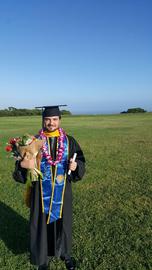"Having faced persecution and educational discrimination in Iran, everything at UCSC amazed me," said recent PhD graduate Holakou Rahmanian. "Face-to-face interaction with professors, dedicated labs for research, even a library with thousands of books about science and engineering. Most importantly, though, I had the opportunity to study without the fear of getting arrested or questioned."
Speaking at his commencement ceremony in Santa Cruz, California, Rahmanian described the hard work it took him and his fellow graduate students to complete their PhDs: Along with the thrill of learning, there were hard late nights of studying and demanding deadlines; bouts of “imposter syndrome” and loss of confidence, as well as moments where miscommunication with advisors made the task even more daunting.
In many ways, Rahmanian sounds like many an ambitious young man getting ready to embark on life. But because he follows the Baha’i faith — Iran’s largest minority religion — his trajectory was more complicated than most.
Baha’is publicly state that they are committed to equality, humanity, and education. But in Iran, they are subjected to severe discrimination, often facing arrest and lengthy jail sentences simply for following their faith, as well as enduring sustained vicious propaganda campaigns from state media. Authorities regularly close down and even vandalize their shops and businesses, carrying out a policy of economic apartheid.
The Islamic Republic also bars them from pursuing higher education. In response to this, Baha’is established their own underground university, the Baha’i Institute for Higher Education (BIHE), in 1987. Today, hundreds of universities around the world recognize BIHE degrees and qualifications, and Baha’is study on post-graduate courses in dozens of subjects in universities around the world. Before moving to the United States to continue his studies, Rahmanian studied at and graduated from the BIHE.
Talking to Saleem Vaillancourt, coordinator of IranWire's sister project Education Is Not A Crime and a journalist for IranWire, Rahmanian described what it was like trying to enter university in Iran. Despite achieving top scores on the Concours, Iran’s national university entrance exams, in 2007, Rahmanian was told his application to study was invalid, and that his grades had not been recorded.
In addition to this blatant disregard for the work he’d done, Iranian officials regard the Baha’i faith as a taboo subject — at one point Rahmanian described how one examining board official refused to even say the word “Baha’i”, choosing to point at it on a letter Rahmanian had submitted to contest the decision against him.
A Gap in Discrimination
Speaking with a characteristic optimism so many Baha’is seem to possess, Rahmanian talked about the gap between this official discrimination and the largely accepting and tolerant approach of Iranian citizens, especially in Tehran.
“My closest friends were actually friends from school ... There was nothing that actually separated us. When I was walking among the people, I did not feel that I was different. We were all people, we were going through struggles, we all had challenges in our life. We had to make a living, we went through education. I had a lot of religious Muslim friends ... friends who in the month of Ramadan invited me to their home knowing that I'm a Baha'i and we had iftar dinner together. When I couldn't go to Iranian university back home, I received a lot of empathy from my friends. I didn’t have any horrible memories of being mistreated.”
And yet Rahmanian says his parents had very different childhoods to his. Growing up in 1950s and 1960s Iran, discrimination and the taboo nature of the Baha’i faith were more deeply entrenched across the society. It was a time when propaganda and misunderstandings about the Baha’i faith went largely unchallenged.
Then, as now, Rahmanian and other Baha’is uphold a simple and unwavering regard for humanity. It’s this natural assumption that equality and respect are key tenets to a happy and productive life that highlights the brutality of the Iranian regime’s treatment of Baha’is, but also the absurdity of such a mentality. Like many an authoritarian regime, Iran’s leaders want to stamp out diversity, perhaps knowing that a strong regard for difference could potentially undermine their grip on power. “I really want to make this very clear that all the discrimination that I experienced in Iran was not from the Iranian people. It was from those in power,” Rahmanian says. At the same time, he has his own idea about strength, resilience and influence. “Diversity is power,” he says.
Resilience in the Face of Persecution
Human rights advocates around the world know that a key part of championing freedoms is to remember what’s happened before. For Rahmanian and the Baha’is, and for Iranian human rights activists in general, it’s important that once Iranian society has overcome and tackled education discrimination, this sustained period in time should never be forgotten.
“It's a huge thing to actually systematically discriminate against a group of people merely because of their beliefs, not because of their skills or anything else, and deprive them of their basic rights to education,” Rahmanian said. “If you are depriving some students, some people, people part of your own community, from studying, it's as if you're cutting off one of your limbs. It actually hurts the society. This must be remembered in order to avoid that happening again anywhere else in the world at any time.”
But with this negative chapter in history, he points out that the “constructive resilience of the Iranian Baha'i community by founding the BIHE” must be remembered alongside it, an act that he says “will be written in the history books.” Faced with horrible injustice, the community responded by giving back. “I'm very proud of the Iranian Baha'i community. They came up with the constructive, non-violent, peaceful solution to fight against this systematic, horrible discrimination. I think this is a story of success. This is a story of victory.”
A Constructive Response to New US Policies
Despite Rahmanian’s abundant positivity, he currently lives in the US — and he admits that the Trump administration’s stance on immigration is personally painful for him. “For me, even though as someone who has experienced discrimination, it's very unfortunate to experience it again as a refugee.”
“In BIHE, things were different and you couldn't have a commencement, so this was the only chance that I actually had to have a commencement ceremony for my entire life.” But because of the travel ban against Iranians and citizens from six other countries, his parents were not able to attend the ceremony. “With the new administration, things have been very tough. My parents couldn't come to the US. I mean, that was my parents' dream.”
But, as with BIHE’s constructive resilience, Rahmanian applauds the fact that people are fighting back. “We must end the cycle. These are tough years, so patience and perseverance are required. I always say if someone gives you poison, you should give them back honey. If you are being mistreated, try to respond in a constructive way. It is the only way. Otherwise the cycle will go on and on and never end... I want to bring it down to my personal level, to my friends, to my community, what I observe. A lot of Iranians are hurting.”
But, like Baha’is before him — some of them jailed for years — he is hopeful for change. He hopes to return to Iran one day, and to contribute to society and the people there. But, he says, if he is not given the opportunity, he will contribute to wherever it is he makes his home. Next he’s off to work as a researcher at Kyushu University in Japan. Whether it’s there, in Iran, or in the United States, he says, he will “contribute and help people, do service and contribute either scientifically or socially. I'd love to do that.”
visit the accountability section
In this section of Iran Wire, you can contact the officials and launch your campaign for various problems

























comments